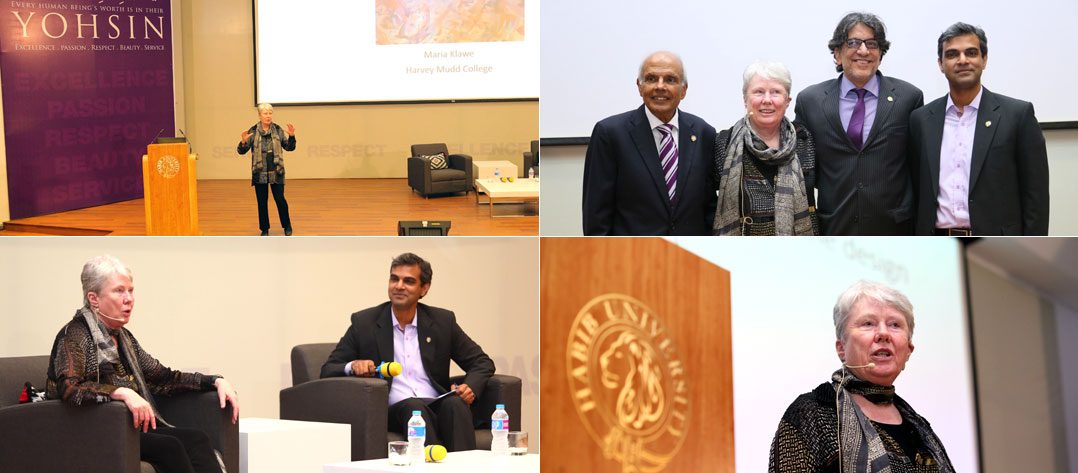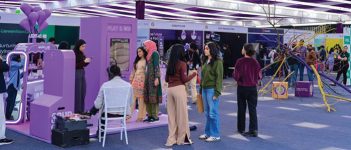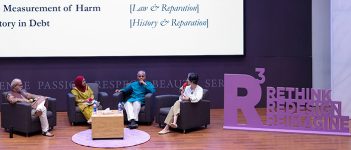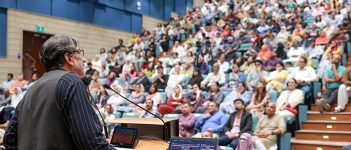The thing I feel pretty strongly about is that there is an error in our society where we equate ease of learning with ability to become the best.
Habib University, Pakistan’s first Liberal Arts and Sciences university in Pakistan, partners and collaborates with leading institutions around the world. For this year’s flagship Yohsin Lecture, Harvey Mudd College (HMC)’s President Dr. Maria Klawe, spoke to an auditorium full of guests from academia, media, the business community, and students on The Importance of a Broad Education speaking to the audience about “why does the impact of your work on society matter? It will not only help make better career choices but help us come up with better solutions to the world’s problems. Studying a diversity of subjects allows us to be better human beings.” She emphasised that “a broad education should include a tightknit learning community, where it is every students responsibility to help every other student succeed”.
The Liberal Arts and Sciences concept of education merges different disciplines together to work towards a more progressive society, and the holistic development of students that are able to understand and work on complex societal issues, including many faced by Pakistan such as energy or migration for example. She said: “You need to develop the experience of overcoming a challenge. […] I feel strongly about an error in our society where we equate ease of learning with ability to become the best.”
”
President @harveymudd Dr. @MariaKlawe being welcome on stage for #HUYohsinLecture pic.twitter.com/yswJwSj9MR
— Habib University (@HabibUniversity) February 20, 2018
HMC’s President, Dr. Klawe is one of the world’s leading computer scientists, with significant contributions in several areas of mathematics, theoretical computer science, human-computer interaction, and interactive-multimedia for mathematics throughout her over 20-year academic career that included serving as Dean of Engineering at Princeton University. Her accolades include being 17th on Fortune’s 2014 List of the World’s 50 Greatest Leaders.
Dr. Klawe’s talk gave examples of success when disciplines are brought together via a transdisciplinary education structure, of facilitating and building teams, and of enabling unusual success:
Learning is something humans do well as a social activity […] The really interesting job opportunities for most people in society are people who can combine human skills, social interactions, with actually understanding automation.
”
“Students at Harvey Mudd don’t compete with eachother”.. I wish our medical school was like this. It’s literally all about competition here and this creates an extremely toxic environment for students. #HUYohsinLecture @HabibUniversity pic.twitter.com/b9PqZnNYJs
— j. (@DigitalZarda) February 20, 2018
Dr. Klawe spoke of her own experiences and how she learned from them. She spoke of her first corporate job, saying “initially when I would run into obstacles, I would think ‘this is the stupidest thing’ rather than thinking ‘this is a challenge. We’re going to have to figure out a way to deal with this challenge and we’re going to learn a lot doing that'”. Very importantly, she spoke to educators on the importance of encouraging learning: “One of the things we need to encourage everyone to do is to understand who you are. There are some things that will come easily to you, and some things that are hard. But that really has nothing to do with how much you can grow in any particular direction. It’s just another piece of this stereotype we have about who can be good at something.”
”
A self-portrait by Dr. @mariaklawe depicting her journey as she went through various phases of decision making throughout her life #HUYohsinLecture pic.twitter.com/sHeWnuZASd
— Rickshaaw Raani (@rickshaw_raani) February 20, 2018
Prior to her steep academic career, Dr. Klawe also worked with IBM Research. Throughout her time, she made it her agenda to advocate for and facilitate women working and being recognized in the hard sciences. As a leading computer scientist herself, she is constantly working for ways to help women and girls in predominantly male-dominated fields and inspired Habib University students:
It is important for everyone to take on subjects and areas that terrify them at first. When you pick up something that is difficult to tackle, that is when you grow the most […] Being male or female in computer science does not matter because employability is high. The applicability of computer science these days is ubiquitous, no matter whether you enjoy painting like me, or music, biology, or development.
Concluding her Yohsin lecture, Dr. Klawe spoke of the similarities between Harvey Mudd College and Habib University, and the importance of what and the way students are taught at both institutions, she stated “Some people feel it is an oxymoron – How can you be a Liberal Arts University of science and engineering? Much like Habib, Harvey Mudd too believes everyone should have a broad and rigorous education. We believe in experiential and interdisciplinary learning and we care deeply about teaching undergrad students to be leaders in their field and good citizens”. Further recognizing the Habib family’s contributions to education stating, “I want to recognise what extraordinary vision the Habib family, the Members of the Board, and the founding president have had. This city and this country is incredibly fortunate to have the kinds of leaders who have made this possible.”
”
Do more for diversity, hire more women, build faculty residents on campus, reach out to students in their early education years and help them choose the career/field they are really passionate about.
cc: @HabibUniversity #HUYohsinLecture— Faiza Yousuf (@FaizaYousuf) February 20, 2018
Harvey Mudd College is a leading Engineering college in the United States of America, whose collaboration with Habib University dates to 2015, with the purpose of deepening an understanding of how science and engineering function in a liberal arts environment. This led to the development of a relationship that helped Habib shape the institutional mechanisms needed for fostering knowledge and a culture of innovation in undergraduate teaching and research.
”
My take away
From #HUYohsinLecture Reassemble , remake or gather yourself to find your perspective about what you wana do in your life , says @MariaKlawe in her #HUYohsinLecture @HabibUniversity— Noreen Shams (@9reen) February 20, 2018
During the current, two-day visit to Habib University, Dr. Klawe frequently interacted with students, faculty and the Board of Governors and reflected that:
I am stunned to see such a young institution doing so well, it is a joy to get to know the people at Habib University. That’s what Habib and Harvey Mudd have in common – it’s about the people.
A dinner was also hosted in her honour at a philanthropist’s residence in the presence of 150 guests, at which she spoke also on the similarities of both institutions with active learning, hands-on projects, undergraduate research, and a highly refined scholarship and financial aid process.
HMC in its first years was not nearly as successful as Habib University. When I visited today, what I noticed was just the vibe amongst the students! […] HU is a beautiful idea that welcomes everyone. It has the potential to transform not just Pakistan and its economy and human development. But more even: showing that it can be done in a country that’s never had a liberal arts institution is going to show that it can be done in many countries around the world, too.
Habib University’s flagship event, the Yohsin Lecture Series attracts local and international audiences alike. Previous Yohsin Lectures have invited some of the most distinguished thinkers of our times, including the likes of Vali Nasr, Dean of the Johns Hopkins School of Advanced International Studies, foreign policy adviser, and author, as well as Dr. Deborah Fitzgerald, former Dean of the MIT School of Humanities. Habib University regularly hosts events open to the public to facilitate discourse and promote civic engagement.
The event was covered by local news bodies such as Dawn Newspaper, Express Tribune, The News, Daily Times, Business Recorder and Pakistan Observer.














